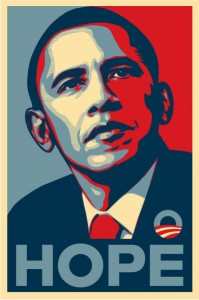
People are Desperate for Hope
According to Google, every day approximately 13,600,000 people search for hope on the world wide web. People are desperate for hope. They think hope is somewhere out there, and they need to acquire it to get what they want from life.
People spend hard-earned money on get-rich-quick schemes that promise hope. They donate generously to religions that give hope. They buy expensive jeans hoping their butt will look smaller. They email a potential employer hoping for a job. Hope is so accepted as the top state of being that if you have real self-confidence, you are often labeled arrogant. Promising hope is now labeled ethical manipulation. But there is nothing ethical about it.
It was really Barack Obama that got me thinking about hope. While running for President, he used the word hope like a mantra. People treated hope as a promise when it was just damn good marketing. I suspect that he was sincere in hoping to change America. But the very word hope implies at least some lack of confidence. At the same time, it is a word that has heavy emotional currency.
I don’t have a problem with marketing if we can see through the veil that covers the real intention. But most people don’t hear beyond the words or see through the Photoshopped pictures. This causes the rich to get richer and the poor to get poorer. When someone gives us hope, they are usually giving us nothing with a nice wrapper.
Official Meaning of Hope
Here are the official definitions of hope from the authorities at Oxford. Notice the definition’s use of the word may and the idea that hope is a feeling.
- a feeling of expectation and desire for a certain thing to happen
- a person or thing that may help or save someone
- grounds for believing that something good may happen
- An archaic feeling of trust
What About Hype?
Hype, on the other hand, means intensive or extravagant publicity or promotion. Recently, I did some research on marketing hype. The number one key ingredient for marketing success is to instill hope in the prospect. You see, great marketers, who can sell sand to Saudi Arabians, know that when we hear the word hope or an inspiring hopeful message, we go unconscious. The seller becomes our master; we are their obedient slaves. We’ll buy anything they have for sale.
I’m not the first to notice this. One anti-Obama group changed hope to hype. Another competitor changed hope to nope. Now, I’m not pro or anti-Obama. He’s certainly not the only candidate to market with some hopeful hype.
We Become Like Children
Once we go unconscious, the politician or salesperson is negotiating with a very young, gullible child. Our discrimination is turned off. We hope that daddy will buy us a bicycle. We have no money, no power, and no transportation to get to the bike store. We just hope that daddy will see our pathetic grin and make our dream come true. Daddy does love and care about us. Doesn’t he? We hope so!
But when hope turns to hype, it becomes a way of looking trustworthy, virtuous, and good. Saying we hope the best for another looks like we care. But if we think that we need to look like we care, we are silently admitting that we don’t.
Down and Dirty With Hope
Let’s drill down below hope and see what lies beneath it. Let’s say we hope that we will get a job. When we think about hoping for the job, do we have the job?
Esoteric wisdom teaches us never to accept what lies on the surface. We should always dig below what seems to be true. Hope is covering up something deeper, something that we need to let go so that we can rise out of hope into having. Let’s look at some possible thoughts that might be hiding below our hope for a job.
-
I’m not sure they liked me
-
I should have worn my blue suit
-
I probably looked desperate
-
I’ll never get a job
-
I’ll run out of money
-
I’ll lose my home
-
I’ll be living on the street
-
I’ll be ashamed
-
I’ll die alone in a dark alley
I’ve done this little exercise with hundreds of people. It only takes a few minutes to go from seeking a new job to dead and homeless once the wrapper of hope is removed. It proves just how fast that express train to hell can travel. Without esoteric wisdom pushing us to look below the surface, we spend our life believing that the iceberg is only the tip that we see.
Given that hope is often masking beliefs of this caliber, can you see why hope doesn’t do any good? Can you see why hope is really just hype? Can you see why hope is really closer to nope? The truth is that when marketing is hype, the competitors will generally expose it. And if we are honest, marketing can’t promise anything. It is all hype wearing a mask of hope.
When someone’s false self pushes our “I’ll die alone in a dark alley” button, we vote for the candidate that promises hope, we run to the church minister that promises heaven, we pay big money for that get-rich-quick scheme because we’ll do anything to get out of the hell that lies below hope.

Three Steps From Hype to Hope
Well there is hope for your hope. And it involves three steps that are not easy or quick, but they work every time.
Step 1: Recognize that hope is worthless currency. You have to get real that you are putting a cherry on a big pile of manure and calling it dessert.
Step 2: Allow yourself to watch and feel the emotion that arises once you realize the hope is hype. Don’t run from it. We want to run because we don’t want the bad feeling of emotions running through our body. You must feel emotion to free it. Emotion is always attached to hope. People say it is a positive emotion, but there is no such thing.
The ancient mystery schools taught that emotion is always an indicator of one thing and one thing only. It means that whatever you are thinking right now in this moment is a belief or lie. Or, whatever you believe from another in this moment is false. Our emotions are a built-in bullshit detector. They keep our mind straight and clear. But we must use them to manage our mind and keep it truthful. We don’t have to fix the other or correct them, but we do have to ignore them when our emotions give us the signal.
What To Do With the Hopesters
People who preach hope are actually covering up their manure with cherries and whipped cream. If we know that, they don’t affect us. That is the key.
They are trying to convince themselves that they can fix our problem. They can’t. They only have hope. If they knew they could fix it, they would say that. If you enjoy manure sundaes, go for it. Imagine what would happen if we ignored every statement from others that felt bad, the hopesters would have to get honest and authentic. We could actually trust each other again.
Step 3: As you watch the emotion, your mind might get quiet. If it does, just keep watching it until all the emotion is gone.
Most likely, your mind will offer up many thoughts much like the list I gave you earlier. In that case, your job is to remember that your emotions are saying that the beliefs you are thinking are false.
If your mind says, “I didn’t wear the right suit.” You notice emotion is present, and you say to your mind, “That is not true. It feels bad to think that.” Once you completely realize that any statement that feels bad is false, the beliefs will leave your mind more quickly. You repeat the process until your mind is clear and you feel no more emotion. The statements that used to look true will now look false, and often you will have an insight of truth.
This process takes practice. This esoteric wisdom was hidden for thousands of years so the elite could gain at the expense of the masses. It sounds crazy at first; but in time, it will ring true.
You are removing your false self belief by belief. Your false self is the elephant that you must eat one bite at a time. Hope is nothing more than a state of mind that is big enough to hide the whole elephant.
Shawshank Wisdom on Hope
In truth, you don’t want hope. My favorite movie is “Shawshank Redemption.” You already know that if you read this blog. My Shawshank DVD begs for a rest when I load it in the DVD player. There was only one line in the whole movie that I didn’t like.
It bothered me that Andy said, “Hope is a good thing. Maybe the best of things.” That line felt bad because it wasn’t really true. Andy had much more than hope. Andy didn’t expect anyone else to free him. He had a logical plan, and he was confident in his ability to follow his plan. Using our emotions to drop our beliefs is exactly what Andy did as he removed the plaster from his cell one pocketful at a time.
He used the word hope only to convince his best friend, Red, that he could trust him. He wanted Red to look toward a better future. Andy’s caring for Red was authentic; it wasn’t hype. Andy demonstrates why we love the word hope, and why we trust it even when it has failed us. You see, when Andy spoke his words of hope to Red, he was really sending him unconditional love. You don’t feel emotions when Andy speaks to Red; you feel the peace and calm of authenticity. And you know, not hope, that Andy’s words will come true. And they did.
